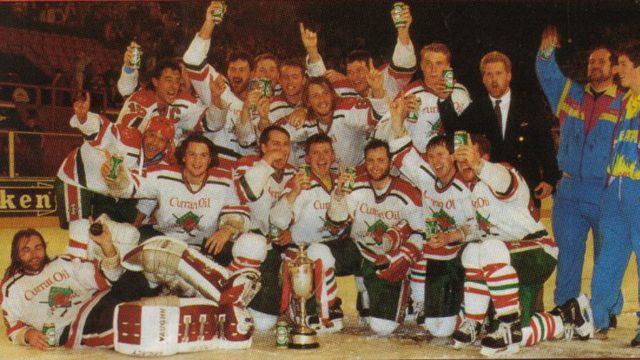When he was trying to sell hockey more than 20 years ago in one of the most soccer-obsessed cities on the planet — Manchester, England, that is — John Lawless stuck to a straightforward message.
“It’s fast. It’s end-to-end. It’s physical,” the Orillia, Ont.-born Lawless would tell people. “You guys are watching soccer — are you kidding me?”
Lawless, now 56 and back living in Orillia — the site of this weekend’s Rogers Hometown Hockey stop — meant no disrespect to the Beautiful Game, of course. But the hockey-player-turned-coach-and-GM had been tasked with filling an arena that seated more than 17,000 people, so he hyped up the game as best he could.
And in the two seasons that Lawless ran the Manchester Storm, starting in 1995-96, that arena actually sold out — twice.
[snippet id=3653171]
When it comes to people who’ve grown hockey in England, Lawless stands out, a player known during his career as both a “tiger” (because he was fierce) and a “weasel” (because he was an agitator). In a 17-year career in the U.K., he played or managed five different teams, was instrumental in introducing the Storm to Manchester and coached the Cardiff Devils to five British Championship finals, at times stepping out of retirement to help the team on the ice.
“When you look back — what a ride,” Lawless says today. “You just got with it, right? You do everything you can to promote the game you’re passionate about.”
Lawless grew up playing in the Orillia Minor Hockey Association. While later suiting up for Centennial College at the University of Toronto, he worked with an assistant coach who had played pro in England — and that’s when he got the idea. Lawless, a gritty centreman who stood five-foot-five “on a good day,” set his sights on playing there once he graduated from U of T. And in 1982, he was signed as an import player for the Peterborough Pirates, a team in England’s third-highest pro loop.
That first season, Lawless led the Pirates in scoring. According to Ice Hockey Journalists UK, he had a whopping 100 goals and 71 assists in just 18 games, which is a ridiculous 9.5 point-per-game clip. And over the next three seasons, Lawless guided the Pirates to a Division One title and a promotion to the Premier League, England’s top echelon.
Career highlights include playing for the British national hockey team at the 1991 Pool C World Championship (he eventually got his British passport through residency) and helping the team move up as far as the A level. He also coached the Cardiff Devils to a 1994 Europa Cup quarter-final victory with a simple tactic:
“‘When you get the puck, what I want you to do, you get it out! Every time. Get it out!'” he says he told his team, laughing. “We freakin’ won.”
Yes, Cardiff dusted two teams from the former Soviet Union in the quarter-final round-robin, and Lawless eventually earned his third Coach of the Year award.

What he’s most proud of is how much hockey grew in England during his time there. Some 35 years ago, Lawless says the top level in Britain was comparable to Junior B in Canada.
“It wasn’t too long after, four or five years later, the top level was like the East Coast Hockey League,” he says. “That’s how much it developed.”
He used to hear things from fellow Canadian players, like, “They play hockey over there in England?” But over the years, more than a few NHL alumni have suited up for British pro teams, including Mike Babcock (Whitley Warriors, 1987-88), Gary Unger (Dundee Rockets and Peterborough Pirates, 1985-88) and Theo Fleury (Belfast Giants, 2005-06).
“In the last 25 years or so it’s definitely more known in Europe and it’s getting more and more known in North America that the British game is really competitive,” he says.
When he moved back home to Orillia in the late ’90s, Lawless resumed coaching, working with a couple of teams, including a local Senior A club. About five years ago, he took a step back from the game.
“I had a real good run at it,” he says.
While the original Manchester Storm folded in 2002, a team with the same name re-launched in 2015, providing evidence of the game’s lasting hold on the city. And as for how Lawless helped create that bond in the first place, he had another strategy: win. He recruited a good team and the Storm went 50-2 in their first season.
“Everybody likes a winner, right?” Lawless says. “The fans loved it, the attendance grew.
“And honestly,” he adds, “the sport sells itself.”

